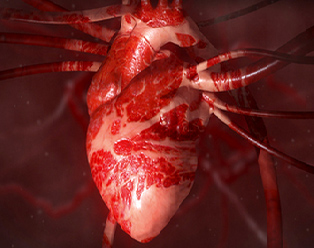Fat or fiction? Swapping saturated fat with 'good' fats reduces heart disease risk factors
Release Date 08 June 2015

Replacing saturated fat (SFA) with unsaturated fat in our diets lowers blood pressure and ‘bad' cholesterol levels, according to new research from the University of Reading.
The study is the largest randomised controlled trial to compare the impact of swapping SFA with either monounsaturated fats (MUFA) or n-6 polyunsaturated fats (n-6 PUFA) on key indicators of heart health.
Key results
- When MUFA replaced SFA, night-time blood pressure was reduced on average by 5 mmHg. A 3 mm Hg reduction in blood pressure is linked to a 5% reduction¹ in risk of dying from heart disease.
- Levels of LDL-cholesterol, sometimes called ‘bad' cholesterol, were reduced by 11-14% when SFA was substituted with either MUFA or n-6 PUFA, which is equivalent to a 17-20%² reduction in heart disease risk.
- Levels of bad cholesterol increased by on average 10 % on a high SFA diet
- There was no significant effect on blood vessel health.
Cardiovascular disease causes more than a quarter of all deaths in the UK. Along with not smoking, having a balanced and varied diet rich in fruit and vegetables and taking regular exercise, a key public health recommendation for the prevention of developing heart disease is to reduce our intake of dietary SFAs. However, this claim is still being questioned by some in the scientific community.
The study
This study involved 195 men and women aged 21-60 years with a moderate risk of developing heart disease, determined by a number of factors including raised blood pressure, blood cholesterol or being overweight. Participants were randomly assigned one of three experimental diets enriched with SFA, MUFA or n-6 PUFA to follow over a 16 week period.
The sources of fat included easy to exchange foods such as oils, spreads, dairy products and snack foods. Other aspects of the diet, including energy, protein and carbohydrate remained unchanged. Participants' blood vessel function, blood pressure, blood fats and other risk factors of heart disease were measured before and after the dietary changes.
Professor Julie Lovegrove, Professor in Human Nutrition at the Hugh Sinclair Unit of Human Nutrition, University of Reading, led the study.
Professor Lovegrove said: "The impact of saturated fat on health is one of the biggest dietary talking points of our generation. Current UK government guidelines advise cutting down on saturated fat, but recent studies have questioned the links between saturated fat and heart disease. This has led, understandably, to public confusion. Well conducted, large-scale dietary intervention studies are therefore vital for policy-makers to continue to provide accurate and evidenced-based dietary advice.
"Our study showed reducing saturated fat in the diet and replacing it with monounsaturated fats lowered blood pressure when measured at night. Replacing saturated fats with monounsaturated fats or n-6 polyunsaturated fats also significantly reduced ‘bad', cholesterol levels."
The findings reinforce current UK government guidelines to replace SFA with unsaturated fats.
Professor Lovegrove said: "160,000 people a year die from cardiovascular disease in the UK alone. The jury is still out as to which of the unsaturated fats is of greater benefit to health. However our research shows that replacing dietary saturated fat with either reduced the risk factors for heart disease."
Dr Alison Tedstone, chief nutritionist at Public Health England, added: "We are glad this study is backing the general consensus: eating too much saturated fat will harm your health. Unfortunately, people are eating too much of it – 20% more than the maximum amount recommended. Too much raises cholesterol levels and increases the risk of heart disease.”
This study was funded by the United Kingdom Food Standards Agency and Department of Health Policy Research Programme (024/0036). Unilever R&D produced and supplied in kind the study spreads and oils according to study specification but was not involved in the design, implementation, analysis, or interpretation of the data.
Replacement of saturated with unsaturated fats had no impact on vascular function but beneficial effects on lipid biomarkers, E-selectin and blood pressure: results from the randomized, controlled Dietary Intervention and VAScular function (DIVAS) study' was published in the June issue of the American Journal of Clinical Nutrition (Volume 101, Issue 6)
ENDS
Notes for Editors
¹ R Stamler: Implications of the INTERSALT study. Hypertension. 1991;17:I16 doi: 10.1161/01.HYP.17.1_Suppl.I16
² Third Report of the National Cholesterol Education Program (NCEP)/ Kris-Etherton et al: High-monounsaturated fatty acid diets lower both plasma cholesterol and triacylglycerol concentrations1-3
Professor Julie Lovegrove has been a leading expert on human nutrition for over 25 years. She has authored/co-authored over 150 peer reviewed papers on nutrition and health. Prof Lovegrove sits on a number of government advisory committees including the Scientific Advisory Committee for Nutrition (SACN).